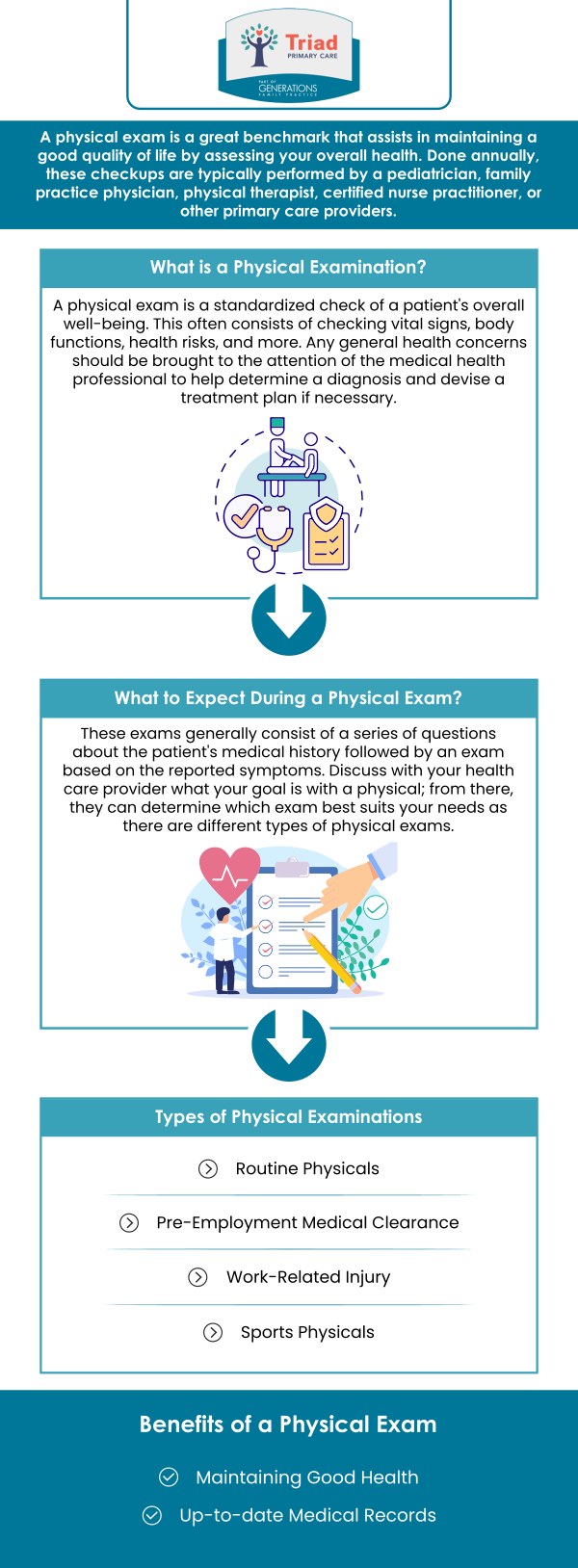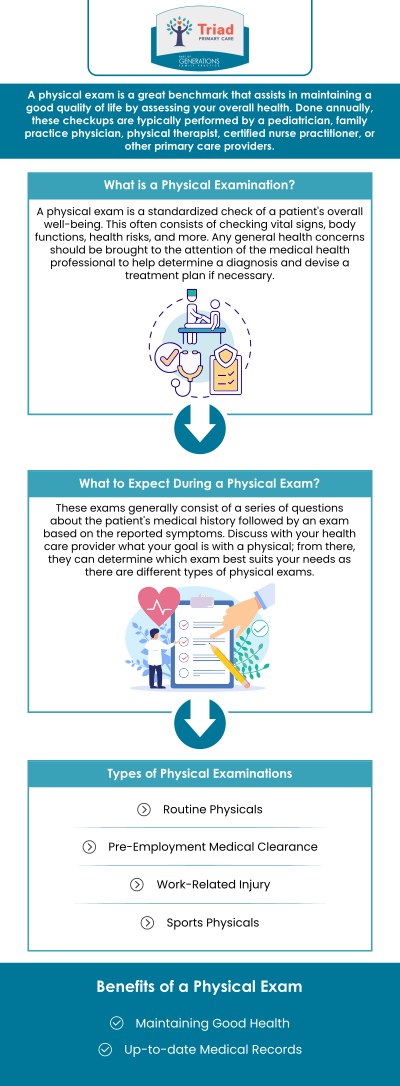How Physical Exams Help Detect Health Issues Early
By examining vital signs, performing tests, and reviewing medical history, a physical exam detects early signs of conditions like high blood pressure, diabetes, or cancer. Early detection through regular physical exams helps in managing health issues before they become serious, allowing for timely treatment and better long-term outcomes. Consult our team to schedule your physical exam and ensure proactive care for your health. For more information, contact us or book an appointment online. We are conveniently located at 1309 Lees Chapel Rd., Greensboro, NC 27455.


Table of Contents:
How can a physical exam help detect health issues early?
How often should I have a physical exam?
Can a physical exam detect diseases before symptoms appear?
What happens if an issue is found during a physical exam?
Physical examinations are essential in maintaining optimal health and wellness. Our comprehensive physical exams allow our experienced healthcare providers to detect potential health issues at an early, more manageable stage, ensuring proactive and personalized patient care.
During your physical exam, our medical professionals utilize clinical methods including observation, palpation, and auscultation to thoroughly assess your overall health. For instance, by checking vital signs such as blood pressure, heart rate, and respiratory rate, we can identify early indicators of hypertension, cardiovascular disease, and respiratory disorders, enabling timely intervention and improved outcomes.
Our providers also carefully examine your skin, eyes, ears, and throat to detect early signs of infections, allergies, or dermatological conditions. Through careful palpation, we can identify any abnormal lumps or growths, which may be indicative of enlarged lymph nodes or tumors requiring further evaluation. Additionally, by listening closely to your heart and lungs, we can detect potential issues such as irregular heart rhythms, heart murmurs, or signs of respiratory concerns.
Our physical exams also include assessments of reflexes, balance, and coordination to identify early neurological issues. We evaluate joint mobility and muscle strength to detect early musculoskeletal conditions or arthritis. Our thorough abdominal examinations can uncover digestive abnormalities, including liver enlargement or gastrointestinal disorders.
We strongly emphasize preventive care at Triad Primary Care. Our routine physical exams provide an ideal opportunity not only for early detection and intervention but also for personalized lifestyle guidance and wellness recommendations tailored specifically to your individual health goals.
By prioritizing regular physical examinations, Triad Primary Care is committed to helping you achieve your best possible health, ensuring peace of mind through proactive medical care and ongoing support.
The frequency of your physical examinations should be personalized to match your unique healthcare needs. Factors such as your age, overall health status, medical history, and personal risk factors all play a critical role in determining how often you should schedule check-ups.
For younger adults without chronic health conditions, a physical examination every two to three years may be sufficient. However, as you age or face specific health concerns, our providers may recommend more frequent visits.
Adults over the age of 50 typically benefit from annual check-ups and regular screenings. At Triad Primary Care, we emphasize preventive care and early intervention, ensuring our patients receive proactive, comprehensive healthcare.
Individuals managing chronic medical conditions such as diabetes, hypertension, or heart disease often require more frequent monitoring, typically on an annual basis or even more regularly. Our experienced providers work closely with you to develop personalized care plans, offering consistent support and guidance along the way.
Additionally, your personal and family medical history can significantly influence the recommended frequency of physical exams. If you have a family history of conditions such as cardiovascular disease or certain cancers, our healthcare providers may suggest increased frequency of screenings and examinations to closely monitor your health.
Ultimately, scheduling a consultation with your provider is the best way to determine how frequently you should have a physical exam. Our dedicated healthcare professionals offer personalized recommendations tailored specifically to your individual health needs, lifestyle, and risk factors.
Physical exams are designed to detect and address potential health issues before they become symptomatic or serious.
During your routine checkup, our physicians and medical staff carefully evaluate key vital signs such as blood pressure, heart rate, respiratory rate, and body temperature. Additionally, we conduct detailed examinations of your cardiovascular, respiratory, nervous, digestive, and musculoskeletal systems to identify any abnormalities or subtle changes that may indicate underlying conditions.
Using proven methods such as observation, palpation (examining by touch), auscultation (listening with a stethoscope), and percussion (tapping gently to assess internal organs), our providers can detect early signs of potential health concerns. For example, conditions like hypertension may be discovered through routine blood pressure measurements even before symptoms like headaches or dizziness occur. Similarly, subtle irregularities in heart rhythms or abnormal heart murmurs identified during examination could reveal early stages of cardiac conditions.
Our providers also look closely for subtle physical changes such as variations in skin color, texture, or temperature; swelling or lumps; or abnormal reflexes and coordination that might signal early stages of conditions like diabetes, thyroid dysfunction, neurological disorders, or even certain cancers. Early detection through regular examinations significantly improves treatment effectiveness and enhances your long-term prognosis.
While comprehensive physical exams serve as a vital first step, we understand their limitations. At Triad Primary Care, we complement these exams with advanced diagnostic testing, including blood tests, imaging studies, urinalysis, and specialized screenings, as needed, to confirm diagnoses accurately and promptly.
If an issue is identified during your physical examination, your Triad Primary Care provider will carefully discuss their findings with you, clearly explaining what was discovered, why it may be concerning, and what the next steps will involve. Depending on the nature and severity of the issue, we may recommend additional diagnostic testing such as blood work, imaging studies (including X-rays, MRIs, or ultrasounds), or referrals to trusted specialists in our broader healthcare network. These evaluations help us accurately clarify your diagnosis and guide appropriate treatment options tailored specifically to your needs.
Our recommendations could include lifestyle modifications and preventive care strategies, medications, therapeutic interventions, or surgical referrals if necessary. Throughout this process, we will schedule regular follow-up visits at our practice to monitor your condition, assess your progress, and adjust your treatment plan as needed.
We firmly believe in patient-centered care and encourage you to openly discuss any concerns, questions, or preferences you may have. Actively participating in your healthcare decisions leads to greater satisfaction and better outcomes. Early detection and proactive management of health issues identified during your routine physical examinations at Triad Primary Care can significantly enhance your overall health, well-being, and quality of life. For more information, contact us or book an appointment online. We are conveniently located at 1309 Lees Chapel Rd., Greensboro, NC 27455. We serve patients from Greensboro NC, Browns Summit NC, McLeansville NC, Oak Ridge NC, Summerfield NC, and surrounding areas.
Check Out Our 5 Star Reviews



Additional Services You May Need
▸ Covid-19 Testing
▸ Medical Weight Loss
▸ Physical Exams
▸ Addiction Treatment
▸ Primary Care
▸ Lab Testing



